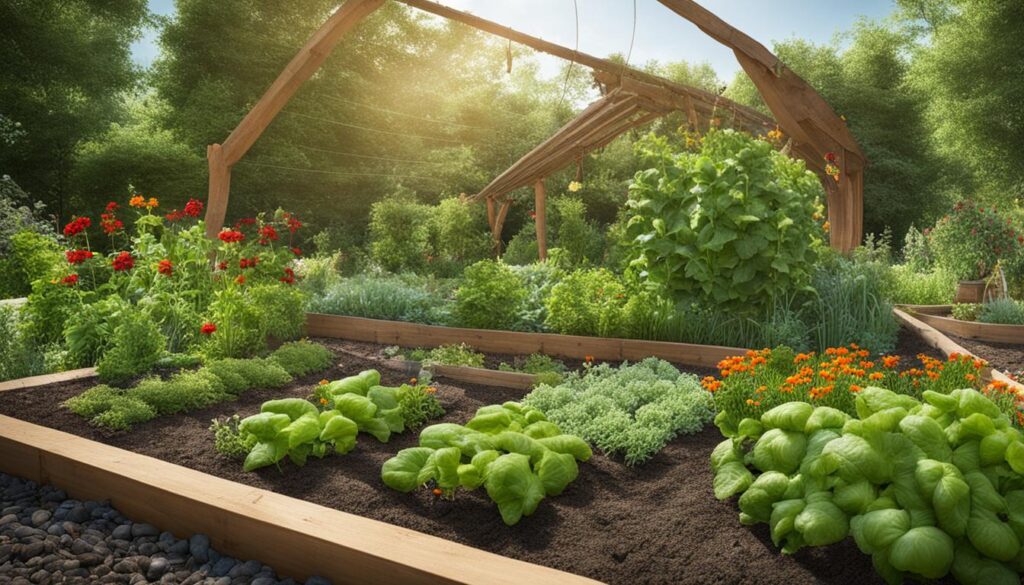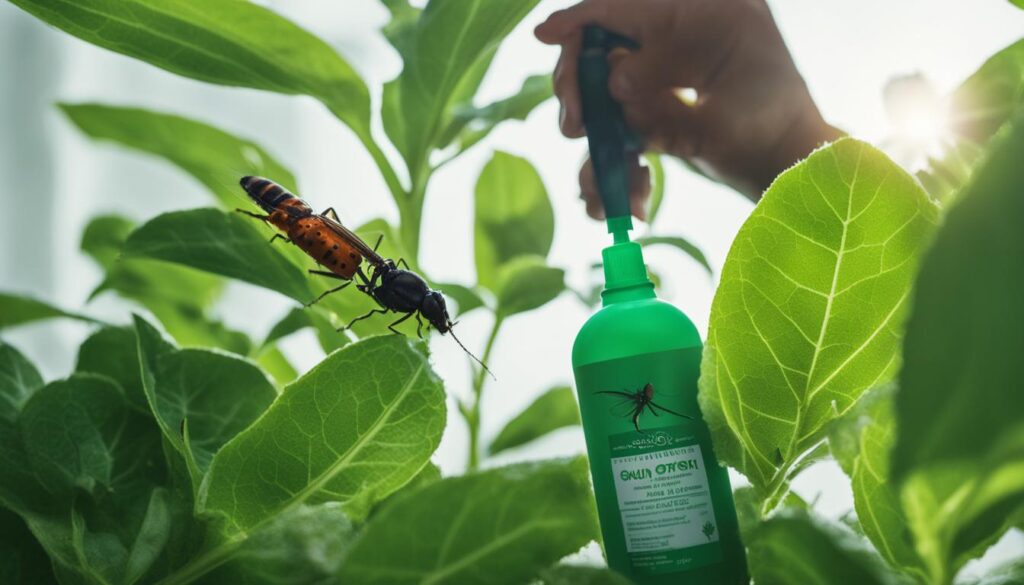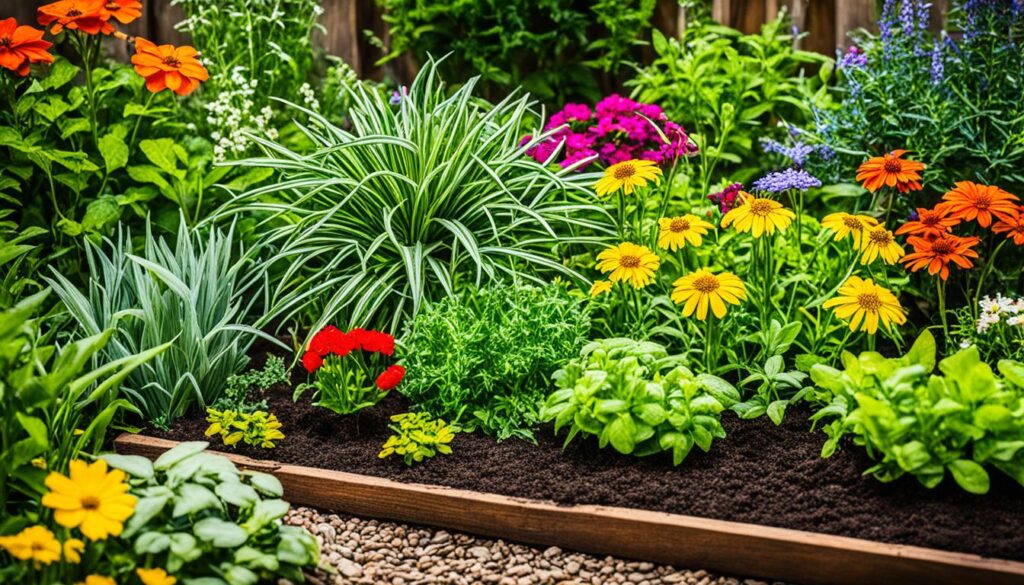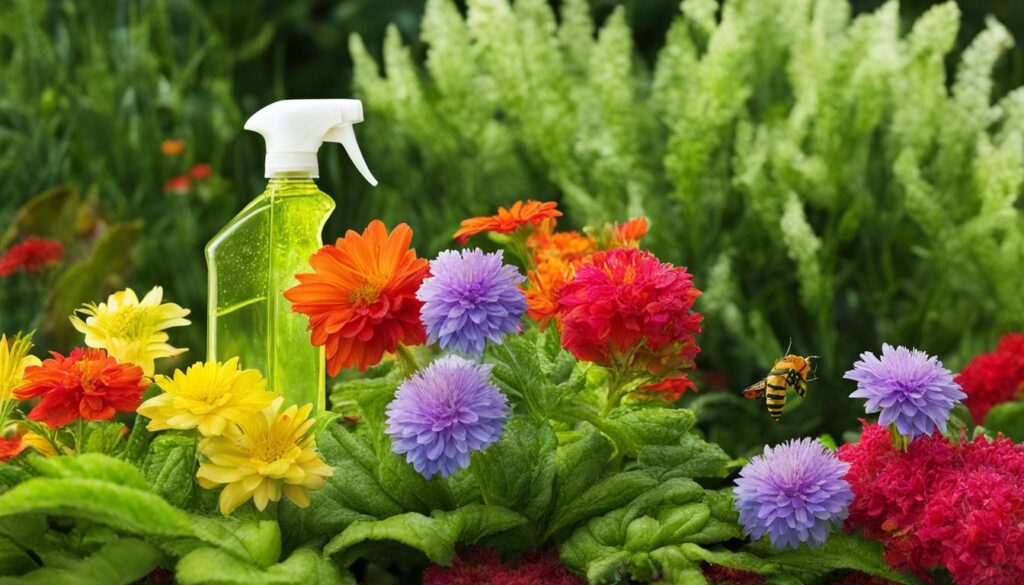Gardening is a delightful and rewarding hobby, but it can be frustrating when garden pests invade and wreak havoc on your beloved plants. Whether it’s aphids, caterpillars, or fungal infections, these unsightly creatures can quickly turn your well-tended garden into a battleground.
But fear not! In this ultimate guide to combatting garden pests, I will share with you valuable insights and effective techniques to regain control over your garden and bid farewell to these unwanted visitors. With the right strategies, you can create a pest-free environment that allows your plants to thrive.
From natural pest solutions to organic pest control methods, we will explore a wide range of approaches to eliminate garden pests and prevent future infestations. By implementing these techniques and practices, you can maintain a healthy and beautiful garden that you can enjoy year-round.
Key Takeaways:
- Combatting garden pests is essential for maintaining a healthy and productive garden.
- Identify common garden pests to choose the appropriate control measures.
- Use organic and biological solutions for environmentally friendly pest control.
- CustomHydroNutrients offers a range of effective pest control products.
- Follow the instructions for optimal use of pest control products.
Identifying Common Garden Pests
Before tackling garden pest control, it is important to identify the pests causing damage in your garden. By recognizing common garden pests, you can implement appropriate control measures to protect your plants. Some of the most common garden pests include:
- Aphids
- Caterpillars
- Slugs
- Snails
- Spider Mites
- Powdery Mildew
- Fungus Gnats
These pests can wreak havoc on your plants, damaging leaves, flowers, and fruits. It is important to closely examine your plants and the surrounding areas to accurately identify these pests.
“Identifying Common Garden Pests is the first step in effective pest control.”
Recognizing Common Garden Pests
Here are some key characteristics to help you recognize common garden pests:
| Pest | Description |
|---|---|
| Aphids | Small, pear-shaped insects that feed on plant sap and leave behind sticky residue. |
| Caterpillars | Soft-bodied larvae that consume leaves, stems, and flowers of plants. |
| Slugs | Soft-bodied mollusks that leave slime trails and feed on plant foliage. |
| Snails | Similar to slugs, snails have a coiled shell and feed on plants. |
| Spider Mites | Minuscule pests that cause discoloration and webbing on leaves. |
| Powdery Mildew | Fungal infection that appears as a white, powdery coating on leaves and stems. |
| Fungus Gnats | Flying insects that lay eggs in damp soil and can damage plant roots. |
By familiarizing yourself with these characteristics, you can easily identify common garden pests and take appropriate action to control their population.
Using Organic and Biological Solutions
When it comes to pest control in your garden, using organic and biological solutions is not only effective but also benefits the environment and promotes a healthier ecosystem. Unlike traditional chemical-based pesticides that can pose risks to the environment and human health, organic and biological pest control methods target pests specifically while minimizing harm to beneficial insects and organisms.
By opting for natural pest control methods, you can ensure that your garden remains environmentally friendly and harmless to both humans and wildlife. These sustainable solutions not only combat garden pests but also contribute to building resilient plants and preserving biodiversity. Here are some key benefits of using organic and biological pest control:
- Promotes a healthier garden ecosystem: Organic and biological pest control methods work in harmony with nature, preserving the balance of the ecosystem and promoting biodiversity. By targeting pests without harming beneficial insects, you can create a thriving garden ecosystem.
- Reduces chemical exposure: Chemical-based pesticides can leave residues on fruits, vegetables, and soil, exposing you and your family to potentially harmful chemicals. Organic and biological pest control methods eliminate the need for these harsh chemicals, ensuring a safer environment.
- Enhances plant resilience: Rather than relying on chemicals to eliminate pests, organic and biological solutions strengthen plants’ natural defense mechanisms. This leads to stronger and more resilient plants that are better equipped to withstand pest attacks.
- Supports sustainable agriculture: Organic and biological pest control methods align with the principles of sustainable agriculture, promoting responsible stewardship of the land. By reducing reliance on synthetic chemicals, you contribute to a more environmentally sustainable future.
Overall, utilizing organic and biological pest control methods not only protects your garden from pests but also contributes to a healthier, more sustainable environment. By adopting these environmentally friendly practices, you can enjoy a thriving garden while minimizing the negative impacts of conventional pest control methods.

The Power of Beneficial Insects
One natural means of pest control in your garden is by harnessing the power of beneficial insects. These predaceous insects feed on garden pests, helping to keep their populations in check. By attracting and supporting these beneficial insects, you can create a natural balance that reduces the need for chemical interventions.
“Beneficial insects are like nature’s own pest control squad. By inviting them into your garden, you’re enlisting an army that’s ready to protect your plants naturally.” – Jane Green, Organic Gardening Expert
Some common beneficial insects include ladybugs, lacewings, nematodes, and praying mantises. You can attract these helpful insects by planting flowers and herbs that provide them with the food and shelter they need. Creating a diverse and welcoming habitat for beneficial insects is an effective long-term strategy for maintaining a pest-free garden.
CustomHydroNutrients’ Range of Effective Pest Control Products
When it comes to combatting pests in your garden, CustomHydroNutrients offers a range of effective solutions to meet your needs. Our pest control products are designed to target specific pests while being environmentally friendly, ensuring a safe and healthy garden ecosystem.
Our product range includes pesticides, insecticides, fungicides, and miticides, all formulated to provide effective pest control without harming beneficial insects and organisms. Whether you have a small backyard garden or a large-scale garden farm, our products can help you effectively manage and eliminate pests.
With our organic pest control products, you can have peace of mind knowing that you are using safe and sustainable solutions in your garden. We understand the importance of maintaining a healthy and thriving garden while minimizing the impact on the environment.
Choose CustomHydroNutrients for high-quality pest control products that deliver effective results without compromising the well-being of your garden. Say goodbye to unwanted pests and enjoy a garden that flourishes with life.

The Benefits of CustomHydroNutrients’ Pest Control Products:
- Target-specific formulations for precise pest control
- Safe for beneficial insects and organisms
- Environmentally friendly and sustainable
- Effective in managing and eliminating pests
- Suitable for small and large-scale gardens
Testimonial:
“CustomHydroNutrients’ pest control products have been a game-changer for my garden. Not only are they effective in managing pests, but they are also safe for the environment. I can confidently say that my garden is thriving thanks to CustomHydroNutrients!”
– Garden Enthusiast
How to Use CustomHydroNutrients’ Products for Optimal Results
To achieve optimal results when using CustomHydroNutrients’ pest control products, it is important to follow the instructions provided. Read the labels and instructions carefully to understand the application rates, timing, and safety precautions. Choose the right product for the specific pest you are dealing with. Apply the product at the recommended timing and frequency, ensuring proper mixing and application techniques. Take safety precautions while using the products and store them properly for long-term effectiveness.
When it comes to using CustomHydroNutrients’ products, following the instructions is key. Each product is designed to target specific pests and has specific guidelines for application. By understanding and adhering to these guidelines, you can ensure the products are applied effectively and achieve the desired results.
Read and Follow Instructions
The first step to using CustomHydroNutrients’ pest control products is to read the labels and instructions carefully. These provide vital information on the product’s composition, application rates, and safety precautions. Pay attention to any warnings or special considerations mentioned, such as protective clothing requirements or restrictions on usage near water sources.
By familiarizing yourself with the instructions, you can gain a better understanding of how to use the product safely and effectively. This knowledge will help you make informed decisions and avoid any potential risks or mishaps during application.
Choose the Right Product
CustomHydroNutrients offers a wide range of pest control products, each formulated to target specific pests effectively. When dealing with garden pests, it is essential to identify the specific pest causing damage and choose the appropriate product to combat it. Applying the wrong product may yield ineffective results and waste your effort.
Refer to the product labels or consult with a gardening professional to identify the pest accurately. Once you have identified the pest, select the corresponding CustomHydroNutrients’ product that is designed to control or eliminate it.
Apply at the Recommended Timing and Frequency
To maximize the effectiveness of CustomHydroNutrients’ products, it is crucial to apply them at the recommended timing and frequency. Different pests have varying life cycles and vulnerabilities, so timing is critical for targeting them effectively.
Refer to the product instructions for guidance on when and how often to apply the product. This information will ensure that you apply the product at the most opportune moments to disrupt the pest’s life cycle and prevent further damage to your garden.
Proper Mixing and Application Techniques
CustomHydroNutrients’ pest control products may require proper mixing and dilution before application. In some cases, specific ratios or measurements need to be followed. Ensure you have the necessary equipment and tools available to mix the product accurately.
When applying the product, follow the recommended application techniques. Sprays may require a particular spraying technique or the use of specialized equipment, while granular products may need to be spread evenly over the affected area. Adhering to these techniques will help optimize the product’s coverage and efficacy.
Take Safety Precautions
When using any pest control product, it is crucial to prioritize safety. CustomHydroNutrients’ products may contain ingredients that can be harmful if mishandled or used incorrectly. Before applying the product, ensure you have the necessary personal protective equipment (PPE), such as gloves, goggles, or masks, as specified in the instructions.
Take precautions to avoid skin or eye contact, inhalation, or ingestion of the product. Follow the safety guidelines provided by CustomHydroNutrients to minimize any potential risks to yourself, other people, or the environment.
Store Properly for Long-Term Effectiveness
To maintain the effectiveness of CustomHydroNutrients’ pest control products over time, it is essential to store them properly. Improper storage can lead to degradation or reduced efficacy of the product.
Store the products in cool, dry, and well-ventilated areas, away from direct sunlight and extreme temperatures. Ensure that the containers are tightly sealed to prevent any leakage or contamination. Adhering to these storage guidelines will help preserve the product’s quality and effectiveness for future use.
By following these tips and guidelines, you can harness the full potential of CustomHydroNutrients’ pest control products and achieve optimal results in your garden pest control efforts.
Additional Tips for a Pest-Free Garden
In addition to using effective pest control products, there are several other tips that can help maintain a pest-free garden. By incorporating these practices into your gardening routine, you can create a healthy and thriving environment for your plants.
1. Practice Good Garden Hygiene
Regular cleaning and debris removal are key in maintaining a pest-free garden. Pests often hide in fallen leaves, weeds, and other organic matter, so keeping your garden tidy reduces their potential hiding spots. Remove dead plants, fallen fruits, and any decaying vegetation to eliminate breeding grounds for pests.
2. Encourage Beneficial Insects
Beneficial insects play a vital role in controlling pest populations naturally. Ladybugs, lacewings, and parasitic wasps are examples of insects that prey on harmful pests. To attract these beneficial insects to your garden, plant flowers and herbs that provide them with nectar, pollen, and shelter. Creating a diverse and welcoming habitat for these predators will help keep pest populations in check.
3. Practice Crop Rotation
Crop rotation involves changing the location of different plant families from one growing season to another. This practice helps disrupt the life cycles of pests, making it harder for them to establish and survive in your garden. By rotating your crops, you can minimize pest and disease build-up, leading to healthier plants and reduced pest pressure.
4. Use Physical Barriers
Physical barriers can effectively protect plants from specific pests. Copper tape acts as a deterrent for snails and slugs, while slug traps filled with beer attract and trap these pests. Row covers made of lightweight fabric or mesh can shield plants from insects and birds. Using these barriers can help safeguard susceptible plants and reduce the need for chemical controls.
5. Practice Proper Watering and Feeding
Proper watering and feeding practices contribute to the overall health and resilience of your plants, making them less susceptible to pests. Ensure that your plants receive adequate water but avoid overwatering, as soggy soil can attract pests and promote disease. Similarly, provide the right nutrients through organic fertilizers or compost to support plant growth and vitality.
By implementing these additional tips, you can maintain a pest-free garden and enjoy the fruits of your labor.
“A well-maintained garden, with proper hygiene practices and a diverse ecosystem, is the foundation for a pest-free environment.”
– Gardening Enthusiast

Overview of Additional Tips for a Pest-Free Garden
| Tips | Description |
|---|---|
| Practice Good Garden Hygiene | Regular cleaning and debris removal to reduce hiding spots and breeding grounds for pests. |
| Encourage Beneficial Insects | Plant flowers and herbs to attract beneficial insects that prey on pests. |
| Practice Crop Rotation | Change the location of plants to disrupt pest life cycles and reduce pest and disease build-up. |
| Use Physical Barriers | Apply copper tape, slug traps, or row covers to protect plants from specific pests. |
| Practice Proper Watering and Feeding | Provide adequate water and nutrients to promote plant health and resilience against pests. |
Use a Dish Soap Spray to Eliminate Smaller Insects
Dish soap spray is an effective and natural method to combat smaller insects like aphids. By mixing dish soap with warm water, you can create a lethal solution for pests while being safe for plants. The soap should not contain bleach to avoid harming the plants. The addition of vegetable oil can make the spray stickier, enhancing its effectiveness.
Creating a dish soap spray for garden pests is a simple and cost-effective solution. The soapy water suffocates the insects by clogging their respiratory system, leading to their demise. It is particularly effective against soft-bodied pests like aphids, mealybugs, and spider mites.
To make a dish soap spray, follow these steps:
- Fill a spray bottle with warm water, leaving some space at the top for the soap.
- Add a few drops of mild dish soap to the water. Avoid using soap with bleach or antibacterial properties as they can harm your plants.
- Optional: Add a teaspoon of vegetable oil to the mixture. This will help the spray stick to the pests and increase its effectiveness.
- Screw the spray bottle cap back on and gently shake the bottle to mix the ingredients.
- Test the spray on a small area of the affected plants to ensure they don’t have any adverse reactions. Wait 24 hours before proceeding if there are no negative effects.
- Spray the soapy water directly onto the pests, covering them thoroughly. Be sure to target both the tops and bottoms of the leaves, where pests often hide.
- Repeat the application every few days or as needed until the pest infestation is under control.
Remember to always apply the dish soap spray during the cooler parts of the day, such as early morning or late evening, to avoid damaging the plants due to the hot sun.

Handpick Larger Bugs
When it comes to larger insects that are not easily controlled by dish soap spray, handpicking is a highly effective method of pest control. By physically removing caterpillars, slugs, and potato beetles from your plants, you can prevent further damage and ensure the health of your garden.
To handpick larger bugs, it is important to take the following steps:
- Put on a pair of gloves to protect your hands.
- Inspect your plants regularly, especially the underside of leaves and along stems, where pests often hide.
- Gently pick the insects off the plants, taking care not to harm the surrounding foliage.
- Dispose of the pests that you have collected in a safe and environmentally friendly manner.
There are two recommended methods for disposing of the insects you have handpicked:
- Squash the insects using your gloves or a plastic bag to prevent their escape and then discard them in a trash bin.
- Place the insects in a plastic basket or container and remove them from your garden, releasing them into an area away from your plants.
Benefits of Handpicking Garden Pests
Handpicking garden pests provides several advantages:
- Organic Pest Control: Handpicking is a natural and organic method of pest control, avoiding the use of chemicals on your plants.
- Precision: By physically removing the pests, you can target specific insects without harming beneficial organisms.
- Immediate Results: Handpicking allows for instant pest removal, preventing further damage and stopping pest populations from rapidly increasing.
- Environmentally Friendly: This method of pest control is environmentally friendly and does not harm the ecosystem of your garden.
By incorporating regular handpicking into your garden maintenance routine, you can protect your plants from larger pests and maintain a healthy and thriving garden.
Comparison of Pest Control Methods
| Pest Control Method | Pros | Cons |
|---|---|---|
| Organic Pest Control | – Safe for plants and the environment – Targets specific pests – Supports a balanced ecosystem |
– Requires consistent monitoring and effort – May take longer to see results |
| Handpicking | – Organic and chemical-free – Precise targeting of pests – Immediate results |
– Labor-intensive – Not suitable for larger infestations – Regular and ongoing effort required |
| Dish Soap Spray | – Natural and readily available – Effective against smaller insects |
– May harm beneficial insects if not used correctly – Limited effectiveness against larger pests |
| CustomHydroNutrients’ Products | – Wide range of effective pest control solutions – Safe for plants and the environment |
– Requires application according to instructions – May have varying effectiveness for different pests |
Attract Carnivorous Bugs
Attracting beneficial insects that prey on garden pests is a natural and effective way to maintain long-term pest control in your garden. Lacewings, ladybugs, nematodes, and praying mantises are excellent examples of predatory bugs that can help keep pest populations in check without causing harm to your plants.
These beneficial insects have specific diets and can be attracted to your garden by creating an environment that provides them with the food and shelter they need. By planting flowers and herbs that appeal to these carnivorous bugs, you can create a welcoming habitat that encourages their presence. This not only helps control garden pests but also contributes to a balanced ecosystem.
Lacewings are voracious predators of aphids, caterpillars, and other small insects. They are attracted to plants such as dill, yarrow, and cosmos, which provide nectar and pollen as a food source.
Ladybugs are well-known for their appetite for aphids, scale insects, mites, and other soft-bodied insects. They can be lured to your garden by planting flowers like marigolds, fennel, and dandelions.
Nematodes are microscopic worms that attack and kill harmful soil-dwelling pests like grubs, weevils, and root-knot nematodes. You can introduce nematodes into your garden by applying them to the soil, especially in areas where pest infestations are a concern.
Praying mantises are skilled predators that feed on a variety of pests, including flies, mosquitoes, and other insects. Creating a habitat for praying mantises involves providing thick and dense vegetation to attract the insects they prey upon.
By creating an attractive environment for these beneficial insects, you are fostering a natural pest control system that reduces the need for chemical interventions. This not only helps protect your plants but also promotes a healthier and more sustainable gardening practice.
Beneficial Insects and Their Prey
| Beneficial Insect | Main Prey |
|---|---|
| Lacewings | Aphids, Caterpillars, Mealybugs |
| Ladybugs | Aphids, Scale Insects, Mites |
| Nematodes | Grubs, Weevils, Root-knot Nematodes |
| Praying Mantises | Flies, Mosquitoes, Beetles, Grasshoppers |
Conclusion
In summary, effective pest control in your garden can be achieved through natural and eco-friendly methods. By identifying common garden pests and utilizing CustomHydroNutrients’ range of pest control products, you can effectively combat unwanted visitors in your garden. Additionally, implementing additional tips such as using dish soap spray, handpicking larger bugs, and attracting carnivorous bugs can further enhance your pest control efforts.
By opting for organic and biological pest control solutions, you not only protect the environment but also promote a healthier and more sustainable garden ecosystem. These methods target pests specifically while minimizing harm to beneficial insects and organisms, ensuring a balanced and thriving garden. With the right approach and the use of eco-friendly pest control techniques, you can maintain a pest-free garden and enjoy the beauty and abundance it brings.
In conclusion, by incorporating effective pest control strategies and embracing natural alternatives, you can say goodbye to garden pests and create a harmonious environment for your plants to flourish. Combatting garden pests through organic and biological means is not only efficient but also contributes to a healthier and more eco-friendly future. So, take the necessary steps to protect your garden, embrace nature’s solutions, and enjoy the benefits of a thriving and pest-free garden.
FAQ
Why is combatting garden pests important?
Combatting garden pests is crucial for maintaining a healthy and productive garden. Pests can damage leaves, flowers, and fruits, leading to reduced yields and compromised plant health. By effectively managing pests, you can preserve the beauty and productivity of your garden.
What are some common garden pests?
Some common garden pests include aphids, caterpillars, slugs, snails, spider mites, powdery mildew, and fungus gnats. These pests can cause significant damage to plants if left unchecked.
How can I identify the pests causing damage in my garden?
By closely examining your plants and the surrounding areas, you can identify the specific pests causing damage. Look for visible signs of infestation, such as chewed leaves, webbing, or discoloration. You can also consult online resources and gardening experts for assistance with pest identification.
Why should I use organic and biological solutions for pest control?
Organic and biological solutions are environmentally friendly and minimize harm to beneficial insects and organisms. They target pests specifically while promoting a balanced and healthy garden ecosystem. Using these solutions helps preserve biodiversity and contribute to a healthier and more sustainable future.
What pest control products does CustomHydroNutrients offer?
CustomHydroNutrients offers a range of effective and safe pest control products, including pesticides, insecticides, fungicides, and miticides. These products are formulated to target specific pests while being environmentally friendly, making them suitable for any garden size or scale.
How should I use CustomHydroNutrients’ pest control products for optimal results?
To achieve optimal results, it is important to follow the instructions provided with CustomHydroNutrients’ pest control products. Read the labels and instructions carefully to understand the application rates, timing, and safety precautions. Choose the right product for the specific pest you are dealing with and apply it at the recommended timing and frequency. Take safety precautions during application and store the products properly for long-term effectiveness.
What are some additional tips for maintaining a pest-free garden?
Some additional tips include practicing good garden hygiene, such as regular cleaning and debris removal, to reduce hiding spots and breeding grounds for pests. Encouraging the presence of beneficial insects like ladybugs and lacewings can help control pest populations naturally. Crop rotation can prevent the build-up of pests and diseases. Using physical barriers, like copper tape or slug traps, can protect plants from specific pests. Proper watering and feeding practices can also contribute to healthier, pest-resistant plants.
How can I use dish soap spray to combat smaller insects?
Dish soap spray is an effective and natural method to combat smaller insects like aphids. Mix dish soap with warm water to create a lethal solution for pests while being safe for plants. Make sure the soap does not contain bleach, as it can harm plants. Adding vegetable oil can make the spray stickier and enhance its effectiveness.
How can I handpick larger bugs for control?
Handpicking is an effective method for controlling larger insects like caterpillars, slugs, and potato beetles. Using gloves, gently pick off the insects from plants and either squash them or place them in a plastic basket for disposal away from the garden.
How can I attract carnivorous bugs for long-term pest control?
Attracting beneficial insects like lacewings, ladybugs, nematodes, and praying mantises can provide long-term pest control. Planting flowers and herbs that provide them with food and shelter can attract these carnivorous bugs to your garden. By creating a balanced ecosystem, you can maintain a pest-free garden.
How can I effectively combat garden pests?
By identifying common garden pests, using CustomHydroNutrients’ pest control products, implementing additional tips, and using natural pest control methods like dish soap spray and handpicking, you can effectively combat garden pests and maintain a healthy and thriving garden.

